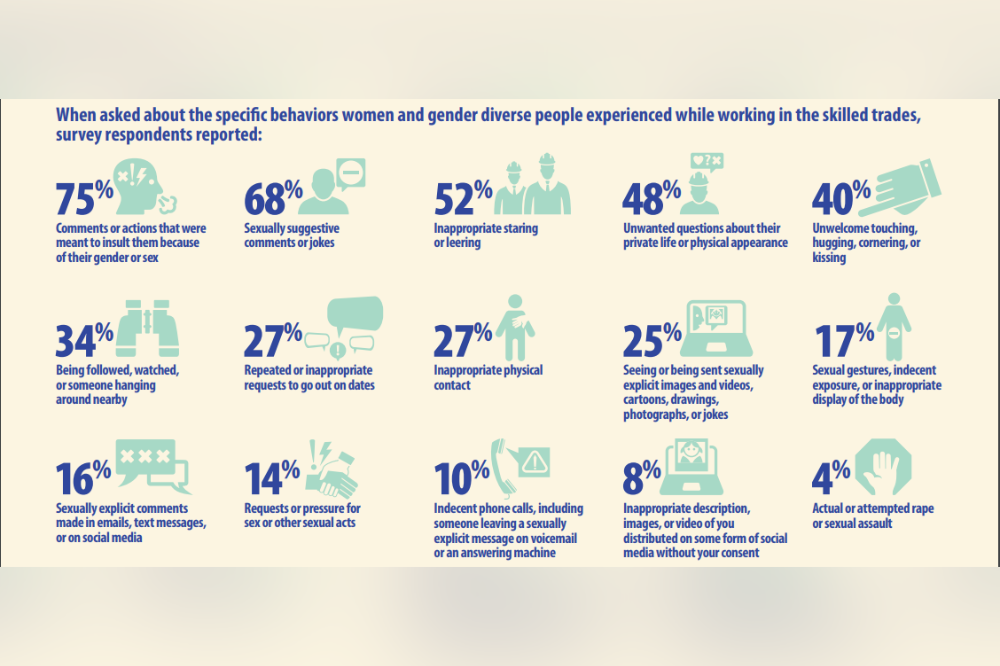Sexual harassment is rampant in skilled trades in Nova Scotia, finds report

An official of one organization of manufacturers in Nova Scotia is calling for a collective action to address the issue of sexual harassment in the skilled trades.
No individual employer or organization can make meaningful change on its own, said Michel Raymond, vice president for the Nova Scotia branch of Canadian Manufacturers and Exporters, in a CBC report.
The statement came after, last week, the Young Women’s Christian Association (YWCA) of Halifax released a report detailing how rampant sexual harassment towards women and those who are gender diverse is in the skilled trades.
Based on their survey, 91 per cent of their 101 women and gender-diverse respondents have experienced at least one form of sexual and gender-based harassment while working in the skilled trades in Nova Scotia. And the majority (84 per cent) of sexual and gender-based harassment occurred while women and gender-diverse people were on a jobsite or at their workplace.
More than eight in 10 (82 per cent) of the respondents said they experienced it more than once.
The following are some of the specific sexual behaviours women and gender-diverse people experienced in the workplace:

Source: YWCA of Nova Scotia
Nearly all (98 per cent) of people engaging in harassing behaviours were men, and 68 per cent were either a direct manager or supervisor, another manager or supervisor, a coworker who was more senior, a school instructor, contractor, or the CEO/ business owner.
More than nine in 10 (92 per cent) of survey respondents reported that their workplaces were male dominated at the time of their most recent experience of harassment.
Despite these, only 26 per cent of survey respondents made a formal report or complaint about their most recent experience of sexual and gender-based harassment. And just 50 per cent of women and gender diverse people who reported sexual and gender-based harassment said there was a formal workplace investigation after they reported.
Only 36 per cent of respondents said that the harassment stopped after reporting it to their company.
"The [YWCA] report is an indication that we need stronger collaboration," said Raymond in the CBC report.
Recommendations for government, employers
To conclude their report, YWCA made the following recommendations:
For the Nova Scotia government:
- Create an amendment to the Nova Scotia Occupational Health and Safety Act to include sexual harassment.
- Create a sector-specific third-party sexualized violence response team to ensure intersectional, trauma-informed, and timely response to issues of workplace sexual and gender-based harassment in the skilled trades.
- Create incentives for training and work with employers and unions to build capacity. Continue to implement and fulfill best value and community benefit agreements.
For employers and unions:
- Commit to continuous training in Diversity, Equity, and Inclusion and psychological safety, from floor to ceiling, with a focus on those in leadership roles to build organizational trust.
- Invest in sexualized violence training for staff who respond to sexual and gender-based harassment incidents to enhance knowledge.
- Create stand-alone sexualized violence policies.
- Sector associations create a staffed, shared service to support small to medium-sized businesses with responding to sexual and gender-based harassment.
For individuals working in skilled trades:
- Practice active allyship and cultural humility.
For future research:
- Future research is needed to further understand the issue of sexual and gender-based harassment in the skilled trades and to gather comprehensive data.
- To address the cumulative harm that women and gender diverse people living with disabilities, 2SLGBTQIA+ community members, immigrant/ refugee, African Nova Scotian, Black, Indigenous, and racialized women, and gender diverse people experience, future work must use a culturally relevant, intersectional gender-based analysis that examines the historical, structural, institutional, and cultural impacts of colonization, slavery, anti-Black racism, anti-Indigenous racism, transphobia, homophobia, intergenerational trauma, and other forms of oppression.
Raymond said he'd like to see a cross-industry strategy to work on the report's recommendations, according to the CBC report.





